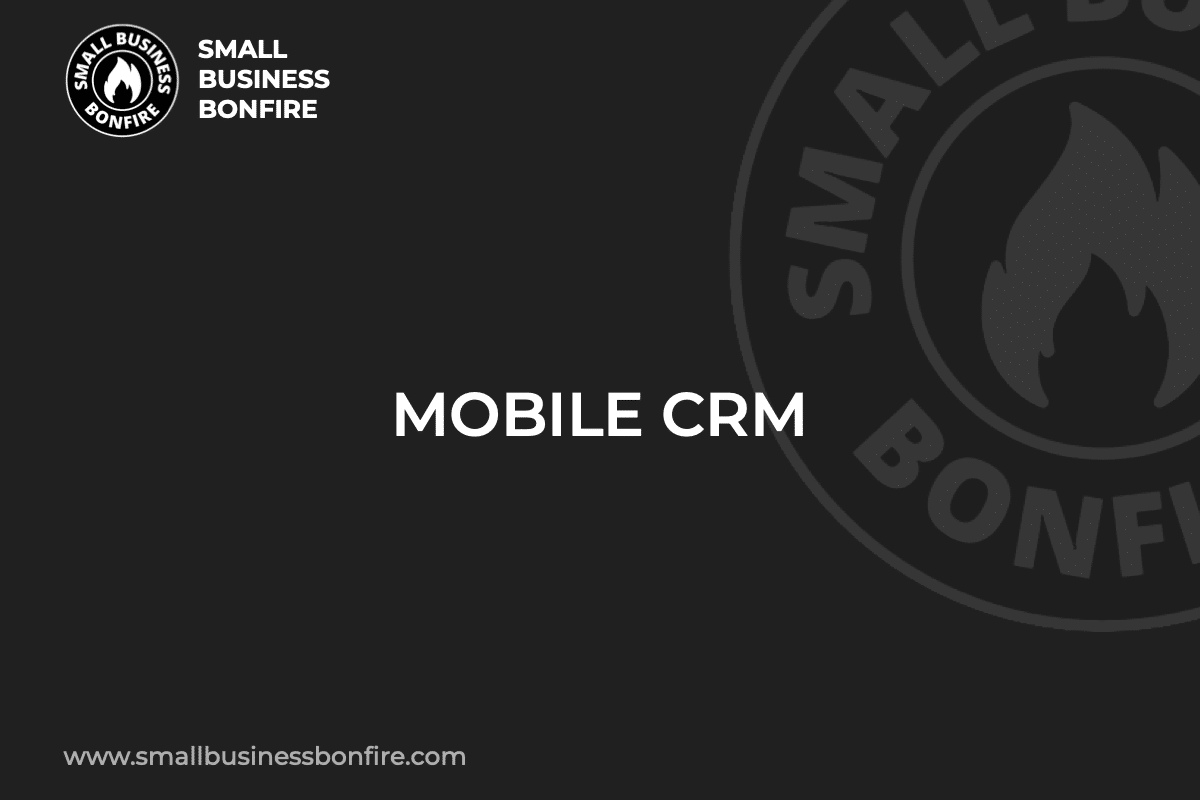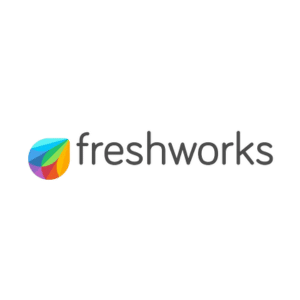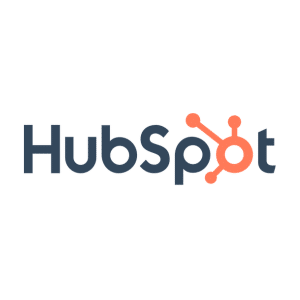Customer relationship management (CRM) is essential for your company to stay organized and efficient.
But how do you implement a mobile customer relationship management (CRM) solution? Finding the perfect software for your business can be challenging with so many options.
Hi! I’m AJ. After spending several years scaling (and eventually selling) my business, I learned why CRM mobile apps are integral if you want to take your company to the next level.
Therefore, I compiled this guide to show you the ins and outs of CRM software, mobile solutions, and more!
Let’s dive into everything a mobile CRM solution can bring to your business!
Key Takeaways
- Mobile CRM software ensures team members can stay in touch and work efficiently regardless of location.
- Determining whether your business needs general use or industry-specific CRM software before investing in the technology is essential.
- Implementing mobile CRM results in better customer service because sales teams can access updated customer data from anywhere and respond to questions and concerns in real-time.
Related Reading: Best Small Business CRM
SBB Featured Partners
What is a Mobile CRM?
Mobile CRM software is an app that provides the functionality and features your desktop CRM system delivers.
Therefore, you can access the tools, data, and other information from a mobile device (smartphone, tablet, etc.) rather than be tethered to a desk.
Typically, mobile CRMs can perform the same tasks and functionalities as the desktop version of the software.
There are several advantages of accessing CRM information from a mobile phone or tablet (which I’ll get into later.)
However, the biggest advantage is that you and your team can stay engaged with your current and potential clients, whether on the road, at home, or at a job site.
Growth of Mobile CRM
The growth of mobile CRM apps is correlated with the increase in mobile apps and smart mobile devices.
That said, there has been an increase in people using smartphones and mobile apps over the past recent years.
Naturally, business owners made it a priority to have their data and information available from smart devices.
Consumers have been demanding mobile app availability for several kinds of software, and customer relationship management solutions are no different.
Mobile CRM software allows businesses to remain flexible and in constant access to customer data and information.
This on-the-go access gives employees more flexibility regarding where they work (home, on the road, in the office).
Additionally, a CRM app ensures customers have around-the-clock service, which is expected more often in today’s digital age.
Why is a Having a Mobile CRM Important?
Your business may currently have CRM software in the office. Therefore, you’re probably asking, “Why do I need a mobile CRM app?”
These CRMs are beneficial for your employees and excellent for your current and potential customers.
CRM tools have a lot to offer (trust me, I’ve used them for years). Refusing to consider mobile CRM systems is a huge mistake for your business!
Let’s see why.
Mobile CRM for Employees
Mobile CRM benefits for employees are tied to freedom and flexibility.
For instance, sales reps and employees no longer have to be tied to a desk to perform their job efficiently.
Instead, these team members can be in a different city, state, or even country and still get their work done with a mobile CRM.
Did you know employees are more productive when they can work from home?
Mobile CRM software and mobile devices allow your team to work from wherever they want without missing a beat.
Mobile CRM for Customers
Mobile CRM software is beneficial for your employees. However, several business owners forget this technology can benefit their customer base too!
Initially, I implemented a mobile app to help my employees’ productivity. I quickly discovered that the app was benefitting my customers as well.
A mobile CRM benefits customers in the following ways:
- It ensures you and your team provide the best customer service possible
- Your team is available at all times to help a customer
- Your team can respond faster and more accurately to customer questions, complaints, and requests
A mobile CRM platform improves your team’s customer interactions because your employees access up-to-date information and updates.
Benefits of a Mobile CRM
There are numerous benefits of mobile CRM, as I’ve mentioned in the previous sections.
Below I’ve listed the most relevant advantages of a CRM app.
Remember, these are only some of the benefits that come with implementing a mobile CRM app. In reality, there are several more advantages worth considering!
Let’s see why mobile CRM platforms are the way to go in today’s digital age!
Real-Time CRM Data
After implementing a mobile CRM solution, my favorite advantage was real-time data and customer information.
That said, a mobile CRM provides you and your team with the most up-to-date information about the following business metrics:
- Sales processes/pipeline
- Urgent tasks and needs (task management)
- Activity and accomplishments of your sales reps
- Lead management information and data
- Marketing tools
- Analytics tools
All the CRM data you need to make informed, data-driven decisions is available in the palm of your hand with a CRM app.
Think of it like you have your CRM dashboard one click away on your smartphone. All the information on your desktop is available on your Apple or Android device!
Better Customer Service
Mobile CRM apps allow your team to provide better, more personalized, and attentive customer service.
For example, when leads try to contact sales reps with a question and don’t receive a response for several hours, they’re more likely to take their business elsewhere.
The same goes for customers asking for help during online shopping on your website. When they get a slow response, they don’t feel appreciated.
Losing business because of slow or untimely responses isn’t a struggle your business has to deal with.
With a mobile CRM system, your company can avoid these struggles because everyone can access updated information.
On top of that, your sales teams can contact and stay in touch with clients from anywhere, allowing them to handle questions and other issues as they happen.
Instant Scheduling
CRM software ensures you and your team can access scheduling tools and a universal schedule containing all relevant events.
Mobile solutions allow team members to seamlessly add events, appointments, and meetings to your company’s schedule.
Therefore, there is a lesser chance of missing sales, essential tasks, etc., when your employees can instantly add things to the calendar.
A shared and updated calendar is an easy and efficient way to ensure everywhere in the company is on the same page.
And better organization and communication improve team morale, boost sales, and betters customer satisfaction rates.
Instant Data Analysis and Reporting
CRM tools do an excellent job of providing detailed reports and data analysis. As a result, you can make better business decisions because updated data back them.
Mobile apps allow you and your employees to analyze company data and create reports quickly.
Therefore, you can make faster business decisions and analyze data from wherever you are instead of waiting to return to the office.
On the Go Data Including:
CRM systems with a mobile app eliminate when and where you can access your data. So, vital information remains at their fingertips as employees move from one location to the next.
Some on-the-go data you and your team can access include the list below. If you want to make the most of your CRM software, accessing this information whenever you want is essential.
Dial Into Meetings on the Go
When one of your sales reps or managers is on the road or at an off-site location, they don’t have to miss an important meeting.
As long as they have a mobile phone or tablet, mobile CRM apps ensure your team stays connected and can share information and other news.
Collaboration tools like this maximize efficiency and productivity, effectively driving more sales!
Access to Leads on the Go
When you’re out in the field, you want to be able to access leads whenever they come in. With a mobile CRM, you can instantly access leads so your sales team can take advantage of all potential opportunities.
Think about it this way – if a lead comes in and your team can’t act on it immediately, other companies may swoop in and take the business away from you.
So, having easy access to leads lets your team respond quickly and accurately when potential customers reach out.
Access to Customer Information on the Go
You can access customer information anywhere and anytime with a mobile CRM app.
Constant access to information ensures your team can provide the best customer service possible while in the field.
For instance, if a customer calls or emails with an issue or question, your reps can quickly pull up their data and find the correct answer.
That way, customers feel valued and appreciated, and your team can quickly respond to their needs.
Access Files on the Go
Mobile apps allow you and your team to access any files stored in the system, meaning you can review business documents and other critical information from anywhere.
Whether it’s sales data or customer insights, having this type of on-the-go access ensures everyone can stay updated with everything in the company.
Additionally, it makes collaboration between teams easier and more efficient.
Everyone can share data in real-time, updating each other with the latest news and business-related decisions!
Respond to Customer Service Inquiries on the Go
Mobile CRM apps ensure you can access customer service inquiries from anywhere.
That way, your reps can respond quickly and accurately to customers in need.
On top of that, they can pull up the correct information to address their needs even when out of the office.
When your team addresses customer issues immediately, customers feel valued and appreciated.
As a result, your team can convert potential clients to paying and repeat customers.
Mobile CRM tools are an excellent way for companies to stay connected with customers and build strong relationships.
You shouldn’t undervalue the meaning of excellent customer service. Thankfully, CRM software simplifies communication channels between customers and your business.
Update Customer Information on the Go
Your company’s customer information is always changing, so keeping those records updated is essential.
With a mobile CRM app, your reps can quickly update customer details from anywhere.
That way, they never miss any important changes that may impact the business or their relationship with a customer.
Plus, having up-to-date customer information allows you and your team to provide customers with better service.
How to Implement a Mobile CRM
Now that you understand the benefits of using mobile devices for CRM, you’re likely eager to implement one.
Implementing mobile CRM is easy when you have the proper steps in place.
Below I’ve listed the six steps my team and I used to implement an efficient mobile app. With these steps, you can implement and utilize your company’s best mobile CRM software!
Step 1: Choose a CRM Implementation Team
The first step when implementing any type of customer relationship management (CRM) system is choosing an implementation team.
What does this team do?
Implementation teams ensure your software is utilized correctly and efficiently.
Therefore, this team trains employees on using the mobile CRM app and sets training guidelines to meet.
An implementation team helps everyone stay on track, ensuring your CRM system is being used promptly.
Your CRM implementation time can consist of current employees, outside hires, or a mixture of both groups!
I’ve hired outside CRM professionals and appointed current employees as my implementation team to ensure a faster and more efficient process.
Step 2: Create Mobile CRM Goals
Next, creating goals related to your new mobile CRM is essential.
How would you like to utilize the mobile app in your sales process? When do you envision the software is up and running?
Consider each area where you’d like to use customer relationship management software in your business.
As you set goals, I’ve also found it helpful to create a CRM-related timeline.
That way, you ensure everybody stays on track with the objectives and understands what they are working toward.
My one recommendation is to stay realistic with your mobile CRM goals. Overly ambitious goals can have the opposite effect on a team.
As a result, your employees aren’t motivated because they feel the goals set for them are hopeless.
Step 3: Research the Best Mobile CRMs
Once you have your implementation team and goals in place, it’s time to research the best mobile CRMs for your business.
I suggest looking at multiple providers since each has its advantages and disadvantages.
Also, ensure you read through customer reviews to get an idea of how well they work for other companies similar to yours.
Further, it’s important to understand whether your business requires general-use or industry-specific CRM software.
Your business demands industry-specific CRM software if you have specialized needs or must follow certain laws and regulations to operate.
Step 4: Test a Mobile CRM
Once you narrow your search, testing a few mobile CRMs is necessary.
Testing customer relationship management systems is especially helpful if you’re on the fence about a program or going back and forth between two systems.
Fortunately, most companies provide free trials so you can ensure the software works best for your business.
Still, there’s such a thing as testing too many CRM platforms. Testing too many results is wasted time and (eventually) frustration.
Before committing to one, I recommend testing at least two or three different CRM apps.
That way, you can compare each platform and decide which works best for your business.
Step 5: Migrate Existing Customer Data
The next step is one of the more mundane aspects of implementing a CRM solution.
However, migrating existing customer data is integral to CRM success within your company.
Some CRMs offer free data transfers, ensuring all your information is migrated correctly and efficiently.
Still, even if a company charges to migrate existing data, it is a worthwhile investment because it saves time and prevents mistakes.
Manually transferring data is at high risk of human error. Using special software prevents these mistakes and ensures your CRM has the correct information when you start using it!
Step 6: Train Your Entire Organization
Lastly, you must train your entire organization on using the new technology.
An implementation team and pre-set CRM plan ensure this process goes as smoothly as possible.
Also, don’t rush training. Employees may take longer to use the new technology in their daily routines.
Explaining the benefits and advantages of CRM systems will encourage employees to get on board faster.
Mobile CRM Tips
Below I’ve listed some tips and tricks I’ve learned after using mobile CRM systems for several years.
Consider these points as you’re researching software and implementing it into your business.
Tip 1: Think About Your Entire Team
It’s easy to see how customer relationship management technology will benefit sales and marketing departments.
However, it’s critical to consider how a CRM system will impact other team members, such as those in HR, customer service, and logistics.
Additionally, consider a CRM’s ability to make team-wide communications easier, as this affects everything in your business, from sales to company morale.
Tip 2: Know Why You’re Using a Mobile CRM
Tip two may seem like strange advice, but I’ve seen countless business owners forget why they decided to invest in CRM software in the first place.
Revisiting your goals is an excellent way to remember why you use a mobile CRM system.
Tip 3: Consider Offline CRM Needs
Not all customer data lives online. It’s essential to consider offline CRM needs when researching software.
For instance, you may need a mobile CRM to integrate with your current POS system to track customer purchase patterns or prefilled receipts.
These are the types of features you should keep in mind during the research phase!
Tip 4: Keep Things Simple
Try to keep your mobile CRM solution as simple as possible.
From research to implementation, CRM-related tasks can get overwhelming.
Stick to the points and features your business needs and only implement training tasks your team will use.
It’s great to ease into implementing CRM software and add various functions and tools as your team adapts to the technology.
Tip 5: Don’t Jump Into a Mobile CRM Too Quickly
Lastly, ensure you aren’t forcing a CRM mobile app too abruptly.
Does your team use mobile devices when they aren’t in the workplace? Are there any work-from-home employees?
Again, it’s essential to think about why your business needs a mobile CRM solution. If you realize you don’t need one, that’s okay!
It’s better to realize this before investing time and money into something that your team will never use.
What To Look for in a Great Mobile CRM
There are four factors I look for in a great mobile CRM, and I’ll share them with you now!
Remember, if your business demands an industry-specific CRM, it’s important to look for those key features.
Optimized Interface
The interface must be intuitive and optimized for all users.
Most importantly, the software must be simple to access and update from mobile phones and tablets.
Collaboration Readiness
Companies optimize mobile CRM platforms for team collaboration.
For instance, the mobile application should streamline and boost team communication.
Look for features like reminders and task lists that sync so updates are available to everyone.
Easy to Upload Ability
One of the main reasons a company implements a mobile CRM system is to access data and information from anywhere.
Therefore, your mobile app must upload information quickly and function with or without an internet connection.
Ease of Use
Lastly, ensure the mobile app is easy to use.
You want your employees to quickly catch onto the functionalities so training doesn’t take too long.
Additionally, easy-to-use CRM software is excellent if it’s your first time using the technology.
Best Mobile CRM
At this point, you’re excited to implement mobile CRM into your business. But where do you start?
I’ve compiled some of the best CRMs you and your team can access on a mobile device.
HubSpot CRM
The HubSpot mobile app grants you access to incredible features and third-party integrations at no additional cost.
Also, the plans are affordable and easy to learn, despite the app’s advanced functionalities.
Key Features
- Third-party integrations with social media platforms and marketing tools
- Contact management tools
- Marketing automation tools
- Advanced caller ID screen
- Business card scanner
Pricing
- Free Tools: $0 (foundational tools for small businesses)
- CRM Suite: $1,600 or $5,000 monthly
- Marketing Hub: $800 or $3,600 monthly
- Sales Hub: $450 or $1,200 monthly
- Customer Service Hub: $450 or $1,200 monthly
- CMS Hub: $360 or $1,200 monthly
- Operations Hub: $720 or $2,000 monthly
Read our full HubSpot CRM review to learn more!
Zoho CRM
The Zoho CRM app offers identical features and functionalities as its desktop does.
And the interface is intuitive, making it perfect for first-time users.
Zoho CRM is tailored toward sales tasks and departments.
Key Features
- Real-time sales pipeline tracking
- Automated lead capture and assignment
- Voice notes
- Important events and tasks are organized in a dashboard
- Location capabilities to identify nearby sales opportunities
Pricing
- Standard: $14 monthly
- Professional: $23 monthly
- Enterprise: $40 monthly
- Ultimate: $52 monthly
Are you interested in learning more about Zoho? Read our full Zoho CRM review!
Pipeline CRM
Pipeline CRM offers customization and advanced features that help you manage deals, organize data, and more!
Creating reports based on various data types is helpful, especially when making business decisions.
This mobile CRM offers all the essential tools for small business sales teams alongside an intuitive interface.
Key Features
- Email campaigns and tracking
- Easy integrations
- Sales forecasting
- Commissions tracking
- Custom deal stages
Pricing
- Start Plan: $25 monthly
- Develop: $33 monthly
- Grow: $49 monthly
We did a full Pipeline CRM review if you would like to learn more!
Freshsales CRM
Freshsales is designed for sales team members and has sales-related mobile capabilities.
Created by Freshworks, the Freshsales mobile app provides a clear, 360-degree view of your customer interactions.
Key Features
- Easy-to-use interface
- Activity timeline for customer and lead interaction history
- Automated lead capture and assignment
- Telephony features with automatic call logging
- Customizable dashboards
Pricing
- Free CRM: $0
- Growth: $15 monthly
- Pro: $39 monthly
- Enterprise: $69 monthly
Learn more about Freshsales in our full Freshsales review!
Conclusion
A mobile CRM system is perfect if team members are based in different locations, travel often, or work from home.
Mobile CRM apps ensure your team can communicate and work efficiently wherever they’re located.
The best mobile CRM depends on your industry, company needs, and preferences. Still, there is a system for you!
What features do you look for in a mobile CRM? Let us know in the comments section! And good luck finding the right mobile platform for your business.
Newsletter Signup
Join The Leads Field Guide Newsletter for tips, strategies and (free) resources for growing your leads, and closing more deals.




